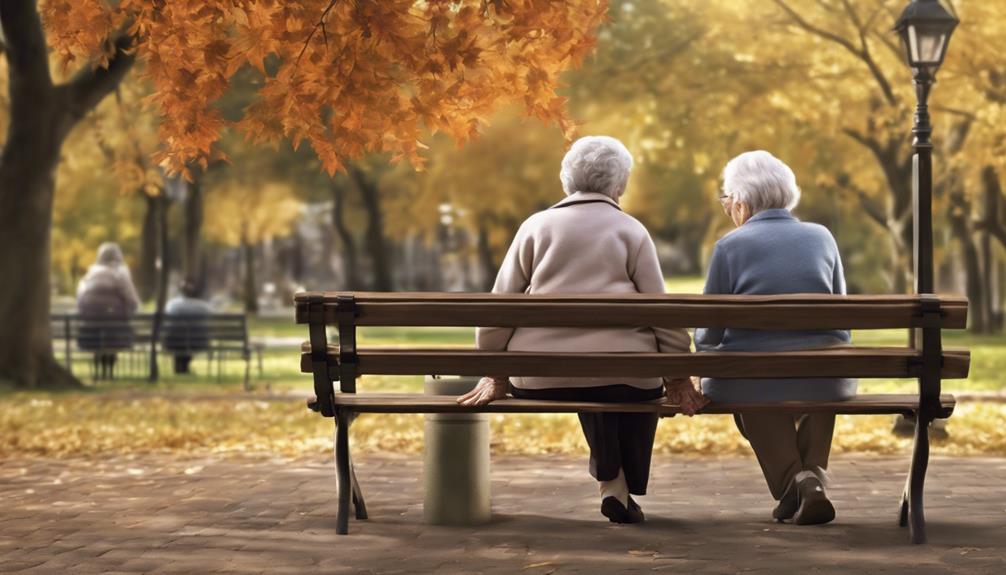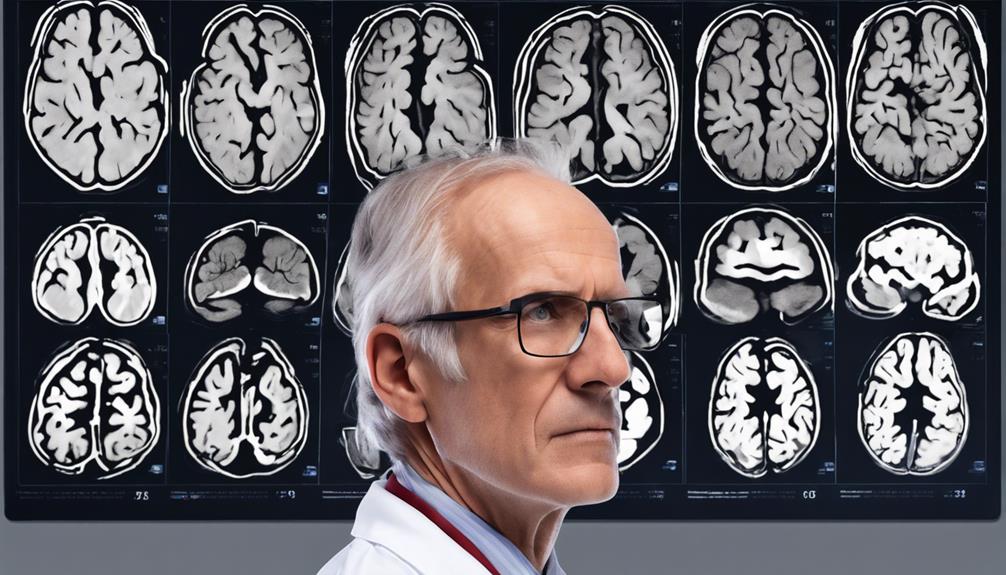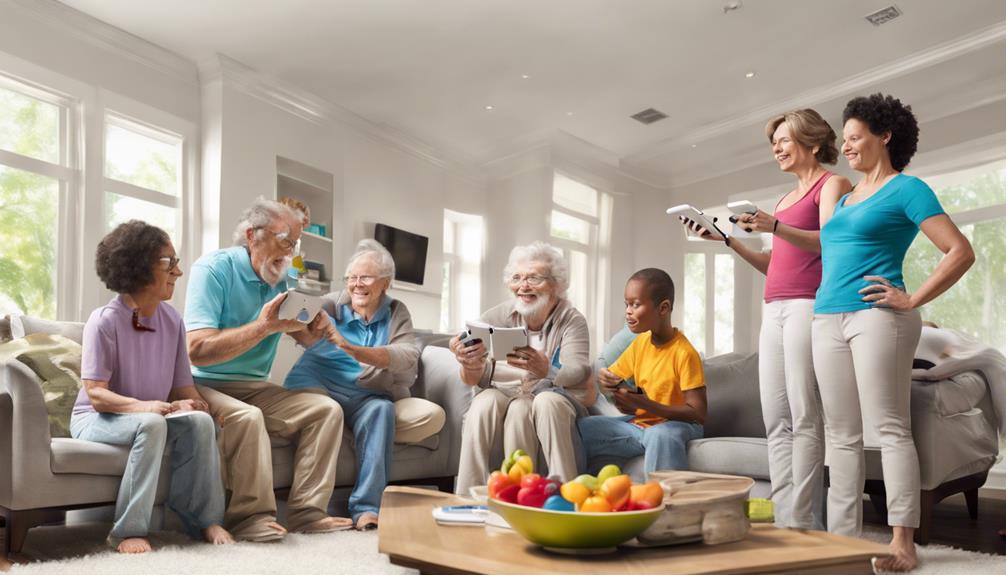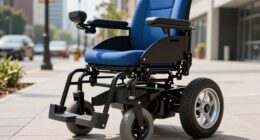Caregivers assist with daily activities such as bathing and getting dressed. They prioritize the well-being, comfort, and dignity of individuals. Caregivers help with walking, fostering independence, and cultivating a positive atmosphere. They aid with grooming, toileting, and managing medications. Caregivers prepare meals, monitor hydration, and promote healthy nutrition. They support mobility, encourage physical activity, and ensure home safety. Caregivers offer emotional support, companionship, and prevent feelings of isolation. They maintain a secure living environment, communicate with healthcare professionals, and collaborate for comprehensive care. Caregivers play a crucial role in overall well-being by catering to individuals’ needs holistically.
I am currently unable to process the request due to encountered difficulties.
Key Takeaways
- Assist with daily living activities like bathing, dressing, and grooming.
- Provide medication management and health monitoring support.
- Prepare nutritious meals tailored to dietary needs and encourage hydration.
- Offer mobility assistance, exercise support, and promote physical well-being.
- Provide emotional support, companionship, and ensure a safe living environment.
Caregivers Role in Daily Activities
Caregivers aid individuals with daily activities like bathing, dressing, and grooming to guarantee their well-being and comfort. These tasks, known as activities of daily living, are essential for maintaining a person's health and dignity.
As a caregiver, our role involves assisting with personal care to make sure our clients feel clean, comfortable, and confident. Whether it's helping someone bathe safely, supporting them in getting dressed, or assisting with grooming tasks like brushing hair and teeth, we work hard to make these activities as smooth and pleasant as possible.
Additionally, we provide encouragement and support with ambulation and mobility, helping our clients move around safely and maintain their independence. By engaging in these daily tasks and activities with compassion and respect, we create a positive and nurturing environment for those we care for.
Providing Personal Care and Hygiene
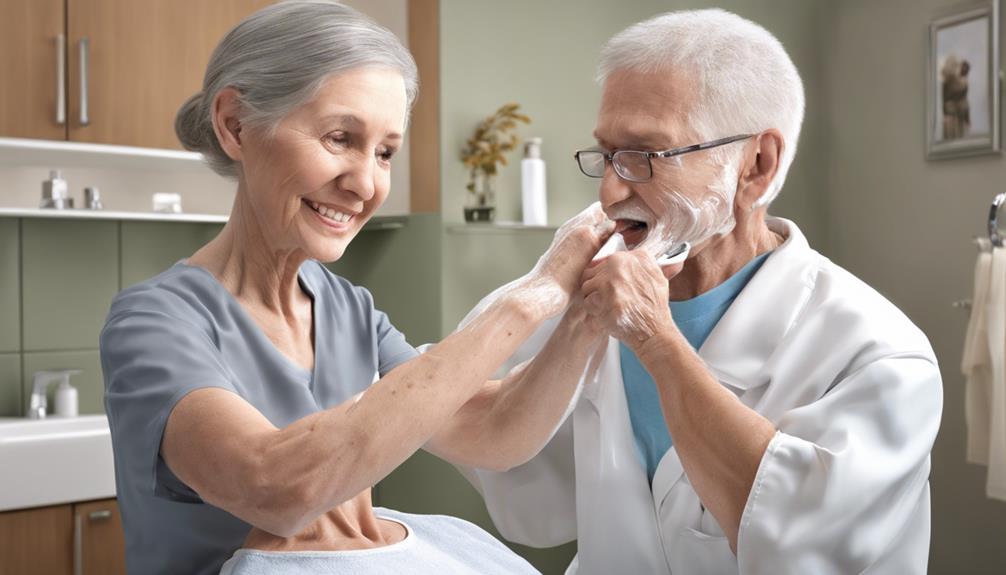
Assisting individuals with personal care tasks guarantees their hygiene needs are met effectively and respectfully. Caregivers play a vital role in helping with grooming, dressing, and maintaining personal hygiene. This includes activities like bathing, ensuring proper oral hygiene by aiding with brushing teeth, and managing toileting needs. Caregivers also provide support with changing adult diapers and managing incontinence to make sure the individual's comfort and cleanliness are maintained.
In addition to these tasks, caregivers help individuals with mobility, transfers, and positioning to maintain their personal hygiene effectively. This involves aiding with moving from one place to another, ensuring they're in a comfortable position, and supporting them in daily activities that contribute to their hygiene routine.
Managing Medication and Health Needs
Assisting individuals with personal care tasks smoothly moves into overseeing their medication intake and health needs to guarantee thorough and coordinated care. Caregivers play a crucial role in managing medication for seniors, ensuring they take their medications as prescribed and avoiding harmful interactions. To achieve this, caregivers create reminder systems for medication dosages, monitor the medication supply, and handle prescription pick-ups. They also take measures to prevent misuse by locking up and counting controlled substances daily. Additionally, caregivers advocate for seniors' healthcare needs, review insurance paperwork, and oversee doctors' orders to ensure proper care and prevent overcharging. This comprehensive approach not only promotes the seniors' health but also provides peace of mind to both them and their families.
| Medication Management | Health Advocacy |
|---|---|
| Ensure medication intake | Advocate for healthcare needs |
| Create reminder systems | Review insurance paperwork |
| Monitor medication supply | Oversee doctors' orders |
| Handle prescription pick-ups | Prevent overcharging |
| Lock up controlled substances | Promote proper care |
Ensuring Nutritious Meals and Hydration
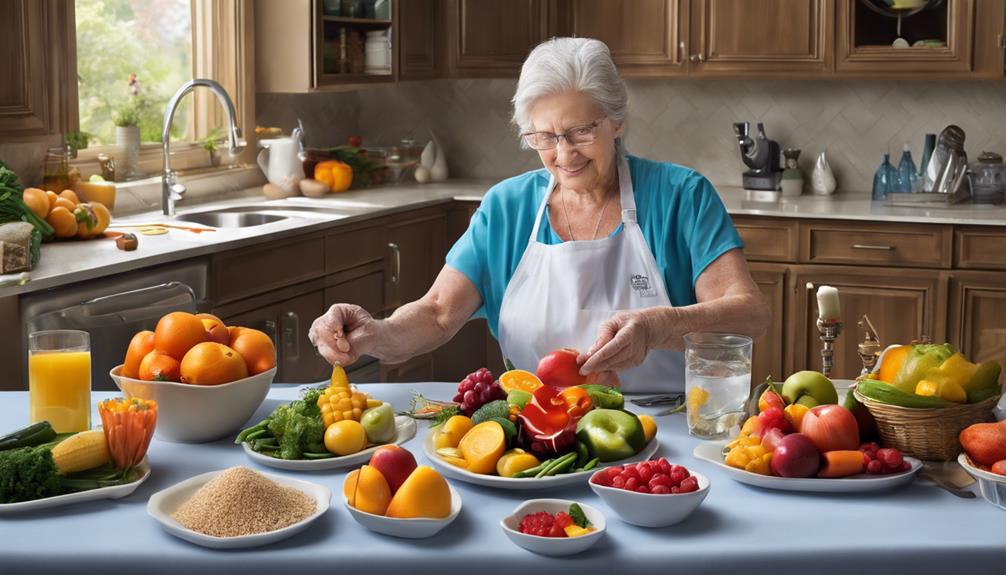
As caregivers, we focus on ensuring that seniors receive nutritious meals and stay properly hydrated. We tailor meal plans to meet their dietary needs and preferences, collaborating with nutritionists if needed.
Monitoring hydration levels and encouraging seniors to drink enough water are essential aspects of maintaining their overall health and well-being.
Meal Planning Strategies
To ensure seniors' nutritional needs are met and promote overall health, caregivers prioritize meal planning strategies that focus on providing nutritious meals and adequate hydration. When planning meals for seniors, we consider their dietary requirements and health conditions. Here are some essential strategies for effective meal planning:
- Consult with a nutritionist: Collaborate with a nutritionist to create personalized meal plans tailored to the seniors' health conditions and preferences.
- Monitor food intake: Keep track of what the seniors eat and adjust meal plans as needed to guarantee they receive proper nutrition.
- Prevent malnutrition: Proper meal planning can prevent malnutrition, help medications work effectively, and enhance the overall well-being of seniors.
Hydration Monitoring Techniques
In our role as caregivers, we employ effective hydration monitoring techniques to guarantee seniors receive adequate nourishment alongside their meals.
We monitor fluid intake by tracking their daily water consumption and offering beverages regularly. Using tools like hydration charts, we record and assess hydration levels throughout the day.
It's important to encourage the consumption of hydrating foods like fruits, vegetables, and soups to help maintain fluid balance. We stay alert for signs of dehydration such as dry mouth, dark urine, dizziness, or confusion.
Consulting with healthcare professionals for guidance on specific hydration needs based on health conditions or medications is essential to safeguard the well-being of those under our care.
Supporting Mobility and Exercise
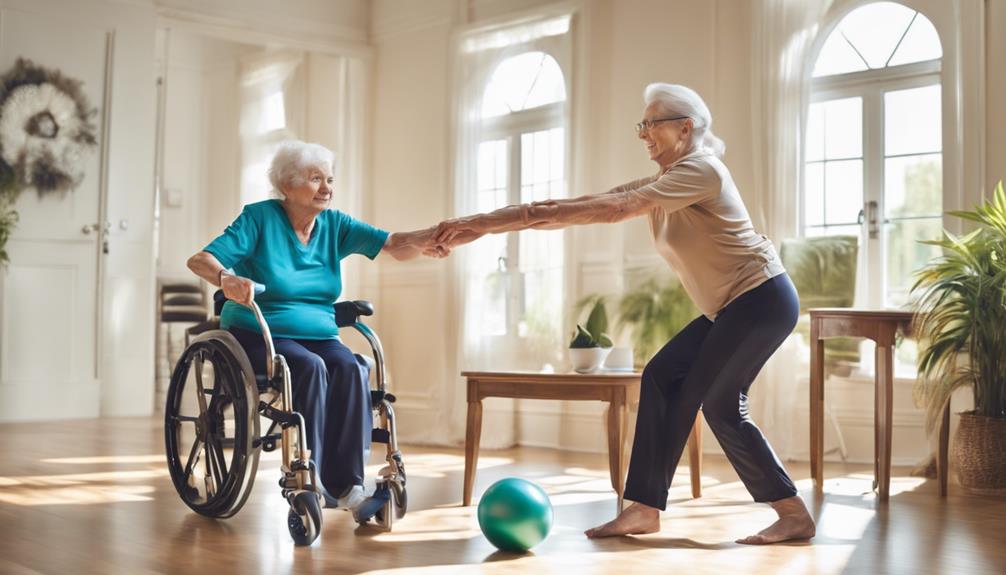
As caregivers, we aid seniors with tasks like walking and transferring to guarantee their safety and comfort.
We also advocate the importance of exercise to sustain mobility and prevent muscle weakness.
Mobility Assistance Techniques
How can caregivers effectively support seniors with mobility challenges through proper transfer techniques and fall risk awareness? Caregivers must utilize techniques that prioritize safety and comfort for seniors.
Here are three essential tips for providing mobility assistance:
- Proper Body Mechanics: Guarantee proper alignment and posture when assisting seniors with movements to prevent strain on both parties.
- Clear Communication: Convey clearly with the senior to establish a sense of trust and understanding during transfers and movements.
- Environment Assessment: Regularly assess the living space for potential fall risks and make necessary adjustments to promote a safe and accessible environment for the senior.
Importance of Exercise
Regularly engaging in physical exercise plays an essential role in supporting seniors' mobility and overall well-being. As caregivers, incorporating various exercises into seniors' routines is important for their physical health. The table below highlights the benefits of exercise for seniors, emphasizing the importance of staying active:
| Benefit | Description |
|---|---|
| Improved Mobility and Balance | Reduces the risk of falls and injuries, enhancing independence. |
| Maintenance of Muscle Strength and Flexibility | Supports functional abilities and daily tasks. |
| Enhanced Cardiovascular Health and Mental Well-being | Boosts heart health, respiratory function, and overall mood. |
Promoting Physical Activities
To promote physical activities and support mobility and exercise for seniors, caregivers actively assist in implementing tailored exercise routines and ensuring safety during physical activities. When supporting mobility and exercise, caregivers play an essential role in enhancing overall well-being. Here are key ways caregivers help in this aspect:
- Creating Customized Exercise Routines: Caregivers design exercise plans that cater to the individual's abilities and health goals.
- Ensuring Safety Precautions: Caregivers prioritize safety by supervising physical activities to prevent accidents and injuries.
- Encouraging Engagement: Caregivers motivate and inspire seniors to participate in physical activities to maintain strength, flexibility, and independence.
Offering Emotional Support and Companionship

Caregivers endeavor to enhance the mental well-being of seniors by providing them with essential emotional support and companionship. Seniors often face feelings of loneliness and isolation, which can have a significant impact on their overall quality of life. By offering emotional support, caregivers create a safe space for seniors to express their thoughts and feelings, fostering a sense of comfort and understanding.
Companionship plays an important role in reducing feelings of social isolation. Caregivers engage in activities such as playing games, chatting, or going for walks with seniors to create meaningful connections. These interactions not only provide companionship but also help seniors feel valued and cared for.
Encouraging social interaction is another significant aspect of caregiving. By promoting social engagement, caregivers help seniors maintain a sense of belonging and purpose. Whether through group activities or one-on-one conversations, social interactions can greatly enrich the lives of seniors and improve their overall well-being. Caregivers play an essential role in offering emotional support and companionship, creating a positive and supportive environment for seniors to thrive.
Creating a Safe Living Environment
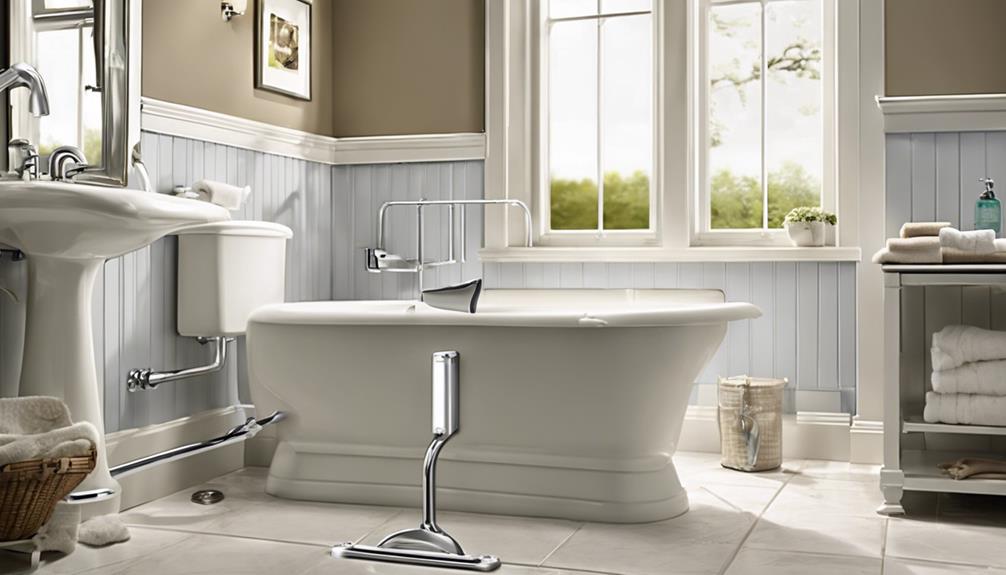
Evaluating household hazards and implementing necessary accommodations is essential for ensuring a safe and comfortable living environment for seniors. As caregivers, creating a secure setting is one of our primary duties to promote the health and well-being of those under our care.
Here are three key ways to enhance the safety of the living environment:
- Install Safety Features: Adding handrails, raised toilet seats, grab bars, and non-skid mats can prevent falls and accidents, making daily activities easier and safer for seniors.
- Utilize Safety Equipment: Incorporating LED nightlights, functional smoke alarms, and fire extinguishers can provide added security, ensuring a prompt response in case of emergencies.
- Enhance Communication: Programming phones to block unwanted calls and considering specialized equipment for communication needs can improve safety and connectivity within the household.
Communicating and Collaborating With Healthcare Professionals

Working collaboratively with healthcare professionals is essential for guaranteeing the best care and well-being of our clients. As caregivers, effective communication and cooperation with doctors, nurses, and therapists are fundamental aspects of our job description. By conveying important information and actively participating in care discussions, we can stay informed about medical treatments and any changes in our client's condition. This partnership enables us to coordinate care plans, address concerns, and ask questions to secure the best well-being of those under our care.
Sharing critical details with healthcare professionals also plays a pivotal role in managing medications, monitoring health conditions, and providing the top-notch care for our clients. Building strong relationships with healthcare professionals fosters a team approach to caregiving, leading to improved outcomes in terms of health and overall well-being. Through open and effective communication, we can work together with healthcare professionals to create a supportive and all-encompassing care environment for our clients.
Frequently Asked Questions
What Is the Responsibility of Caregiver?
We guarantee the well-being of those we care for by managing medications, assisting with mobility, offering companionship, and promoting a safe and engaging environment. Our responsibilities include supporting health needs, fostering social connections, and enhancing quality of life.
What Is Expected From a Caregiver?
We make sure medication is administered correctly and offer emotional support. Our tasks include assisting with daily living, managing household chores, and creating a safe environment. Communication and following instructions accurately are crucial expectations from us.
Is Working as a Caregiver Hard?
Working as a caregiver is demanding, yet rewarding. We face challenges with empathy, patience, and dedication. Long hours and varied tasks require flexibility and problem-solving skills. Despite the difficulties, we find fulfillment in making a positive impact. It’s essential, however, for caregivers to prioritize their own well-being to prevent burnout, which can affect both our mental and physical health. One useful tool is the *caregiver burnout evaluation quiz*, which helps assess stress levels and identify when we might need additional support or a break. By being mindful of our own limits, we can continue providing the best care possible to those who depend on us.
What Is the Main Goal of a Caregiver?
Our main goal as caregivers is to provide physical, emotional, and practical support to those in need. We aim to enhance their quality of life by promoting independence and ensuring their well-being and safety.
Conclusion
To sum up, Caregivers are like the unsung heroes of everyday life, providing essential support and care to those in need. From assisting with daily activities to ensuring health and well-being, caregivers play a pivotal role in enhancing the quality of life for individuals.
Their dedication and compassion create a safe and nurturing environment, allowing individuals to thrive and live to their fullest potential. So next time you see a caregiver, remember the incredible impact they've on the lives they touch.
